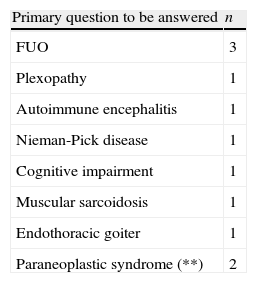Our objective was to analyze all the rejected PET/CT-request forms (rf), its primary question to be answered and the impact of not performing the PET/CT studies for the management of the patients.
Material and methodsWe retrospectively reviewed all the cancelled PET/CT-rf received in our department from January 2007 to June 2011. The reasons for cancelling were patient clinical status, request from referring physician, patient request and criteria of nuclear medicine physician. PET/CT-rf were classified according to the primary question to be answered. The clinical evolution of patients was followed up for 6 months after PET/CT was requested.
ResultsThirty-nine studies were cancelled due to the patient clinical situation (mainly advanced state of neoplastic disease), 46 due to request from referring physician, 18 by patient request and 74 PET/CT-rf were rejected due to nuclear medicine physician criteria. Thirty-four patients with a rejected PET/CT had known neoplastic history. The more prevalent primary questions to be answered were: evaluation of pulmonary (20) and bone lesions (13). Regarding pulmonary nodules, only 4 patients had previous neoplastic disease and their size was less than 5mm. The rejection of PET/CT studies did not cause any impact in the natural evolution of the disease of the patients.
ConclusionThis procedure avoided unnecessary PET/CT scans reducing expenses and radiation without any detriment in the patients.
Nuestro objetivo fue analizar todos los volantes peticionarios rechazados de PET-TAC, el motivo primario de solicitud y el impacto de no realizar esta exploración en el manejo de los pacientes.
Material y métodosRevisamos retrospectivamente todos los volantes peticionarios de PET-TAC recibidos y cancelados en nuestro servicio desde enero de 2007 a junio de 2011. Los motivos de cancelación fueron situación del paciente, por solicitud del facultativo peticionario, debido a requerimiento del paciente y según criterio del médico nuclear. Los volantes de PET-TAC fueron clasificados según el motivo primario de solicitud. La evolución clínica de los pacientes fue valorada mediante un seguimiento clínico de hasta 6 meses tras la solicitud de la PET-TAC.
ResultadosTreinta y nueve estudios fueron cancelados debido a situación clínica del paciente (principalmente estado avanzado de la enfermedad), 46 debido a requerimiento del facultativo peticionario, 18 por petición del paciente y 74 volantes fueron rechazados según el criterio del médico nuclear. Treinta y cuatro pacientes con solicitud de PET-TAC rechazada tenían antecedente neoplásico. Los motivos primarios de solicitud a ser contestados más prevalentes fueron: evaluación de nódulos pulmonares (20) y lesiones óseas (13). En relación a los nódulos pulmonares, solo 4 pacientes tuvieron antecedente neoplásico previo y su tamaño fue inferior a 5mm. El rechazo de estudios PET-TAC no causó impacto alguno en la evolución natural de la enfermedad de los pacientes.
ConclusiónEste procedimiento evitó PET-TAC innecesarios reduciendo costes y radiación sin ningún detrimento en los pacientes.
Article

Revista Española de Medicina Nuclear e Imagen Molecular (English Edition)








